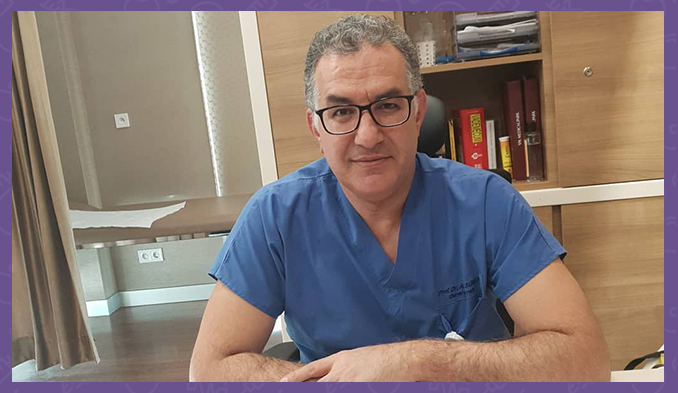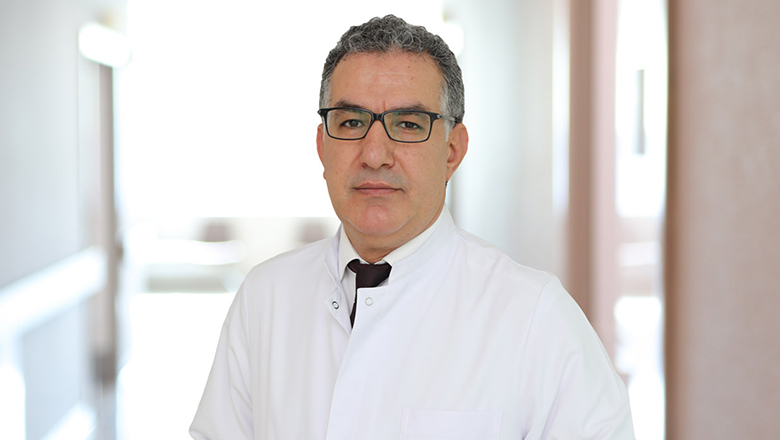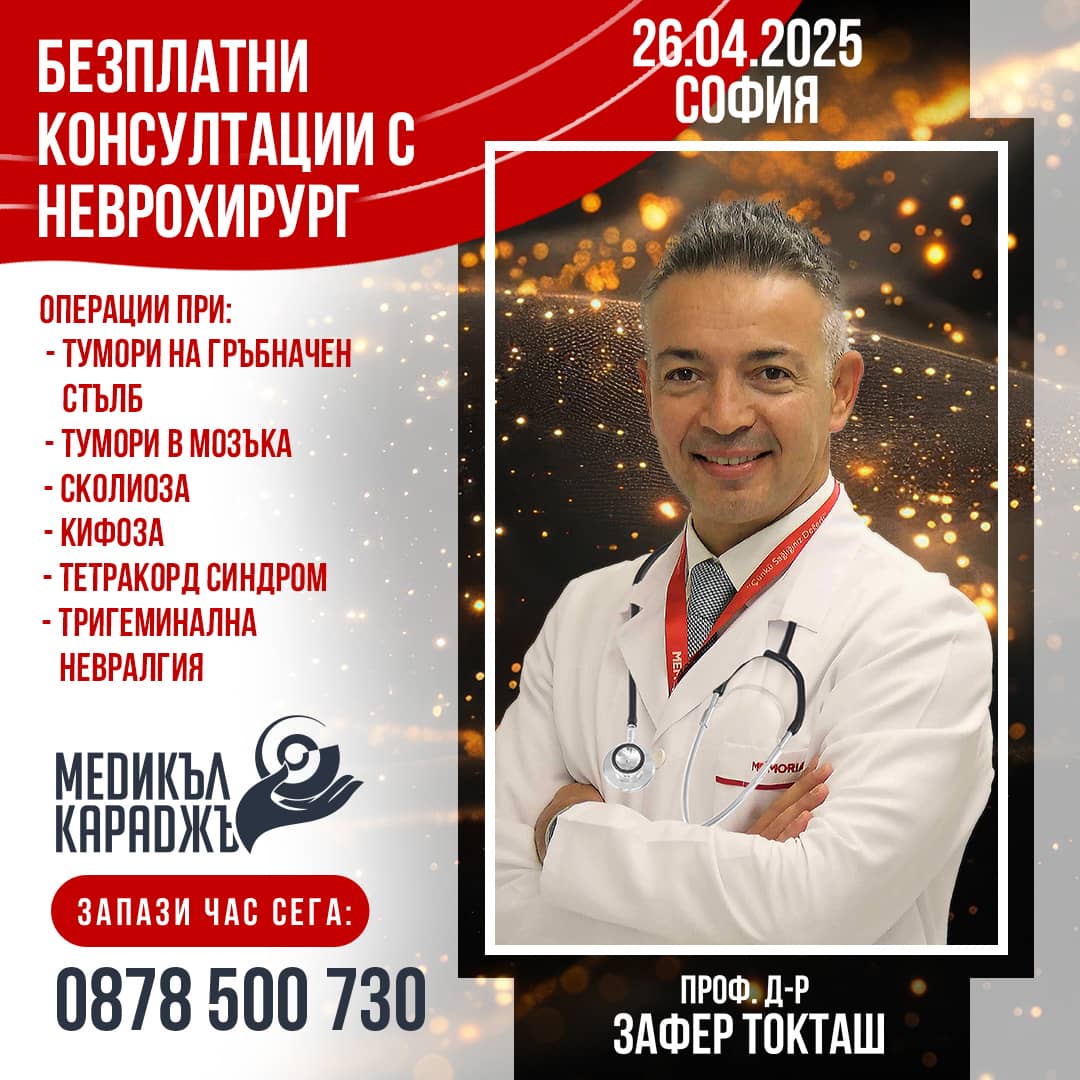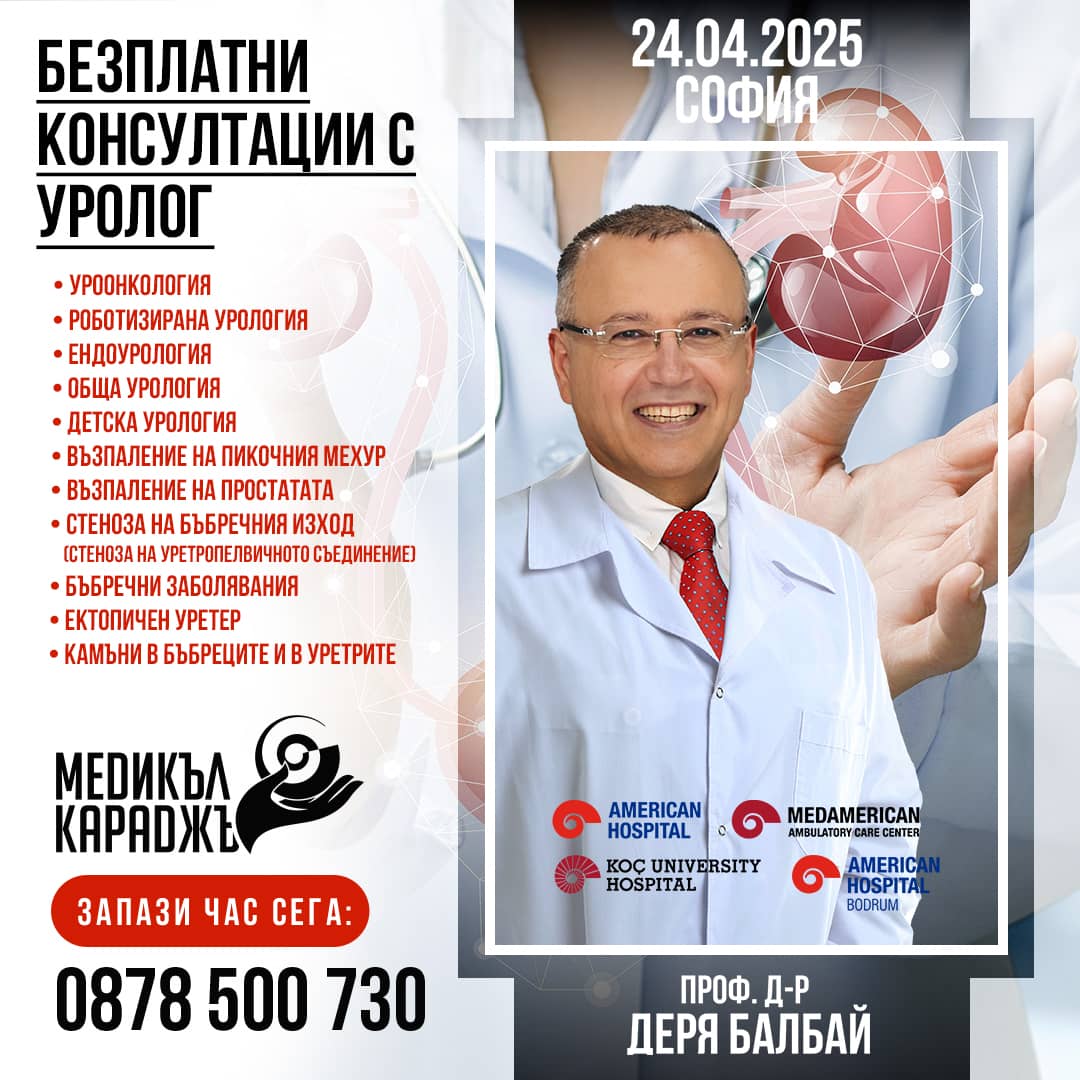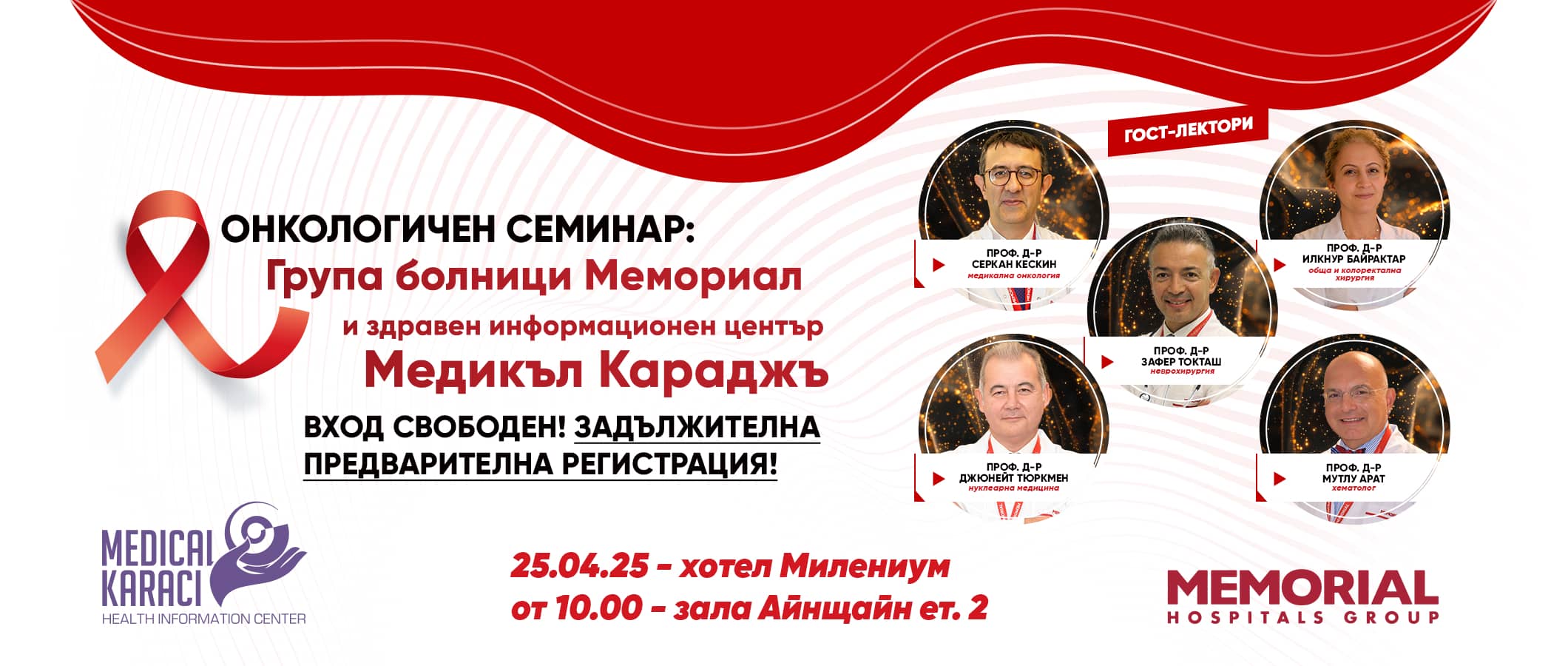The surgeon Prof. Dr. Aziz Sumer with international recognition in the field of bariatric and metabolic surgery will be a guest of ZIC "Medical Karaj" on 19 December 2019 in Sofia. He is coming to Bulgaria for free consultations at the invitation of Zvezdelina Lutfi, the manager of Medical Karadji. The consultations, which will be conducted by Prof. Dr. Sumer, will take place within the framework of our initiative to provide Bulgarian patients with access to the latest methods and technologies in medicine. Prof. Dr. Aziz Sumer practices general surgery, but specializes in metabolic surgery, bariatric surgery, and the treatment of Type 2 Diabetes.
His visit gives patients with overweight, obesity and type 2 diabetes the opportunity to consult the renowned specialist free of charge in Sofia.
All patients coming for consultation with Prof. Dr. Sumer will get 15% discount if they need surgical interventions.
Overweight and so-called obesity are the epidemic of the 21st century. According to the World Health Organisation, they now affect more than 1.7 billion people worldwide. In ancient times, excess weight was considered a sign of wealth and prestige, but today we already know that it can bring with it serious health problems and reduce life expectancy. Morbid obesity is considered the second most common cause of death in the world after smoking and can cause insulin resistance, type 2 diabetes, hypertension and heart problems, steatosis (fatty liver). Due to restriction of lung function, excess weight can lead to asthma and sleep apnoea. It is also considered to be one of the significant factors in the occurrence of a number of cancers, including breast, uterine, colorectal and other cancers.
Over the past 10 years, surgeries to surgically treat weight problems have increased by 761%. They are resorted to when traditional methods such as diet and exercise do not work. Since the first bariatric surgery was performed in 1950, a variety of methods have been tried to perform abdominal weight loss surgery. Nowadays, about 10 different surgical methods are successfully used to treat obesity and diabetes, and choosing the most appropriate method according to the patient's condition is key to the outcome of the surgery.
This requires the assessment of an experienced surgeon who is proficient in all applicable surgical techniques and uses them routinely. The importance of the surgeon's skills is indicated by the fact that complications of bariatric surgery range from 0.17% to 7%, depending on the experience of the medical team. Operations to treat diabetes and obesity that are performed by teams experienced in this field and in clinics with the necessary equipment to manage complications are usually successful.
Who is Prof. Dr. Aziz Sumer?
Prof. Azis Sumer has been practicing for 22 years and has honed his skills in Turkey as well as in Austria, France and Italy. He routinely uses laparoscopic (closed) techniques and robotic surgery. Since 2018, he has been working at Gaziosmanpasa Medical Park Hospital in Istanbul.
Prof. Dr. Aziz Sumer is a world-class surgeon practicing at the Turkish Medical Park Hospital, Istanbul. He completed his M.D. in 1997 at the Akdeniz University Faculty of Medicine. In 2012, he completed his associate professorship in general surgery at Yuzunku Yul University Faculty of Medicine. In 2017, he became a professor of general surgery at the same university.
His professional experience began in 1997 in the emergency department of the Afyon Dinar State Hospital. The period from 1999 to 2001 he was in charge of hemodialysis at the Istanbul dialysis center REN-MED. Until 2005, he worked at Istanbul Haydarpasa Numune, a research and teaching hospital. In 2005, he continued his practice at the Medical University of Vienna, Austria and AKH Hospital in the Department of General Surgery and Endocrine Surgery Clinic. In the following years, Prof. Dr. Sumer worked and specialized in several public hospitals in Istanbul. His practice and development in new medical and surgical developments passed through hospitals in Seville - Spain, Strasbourg - France and Rome - Italy. He is one of the surgeons working with the innovative da-Vinci® surgical system.
His interests and practice are developed in the following medical directions:
- General Surgery
- Obesity and metabolic diseases
- Diabetic surgery
- Laparoscopic and robotic oncological surgery
- Laparoscopic colorectal surgery
- Endocrine surgery
- Laparoscopic and robotic hernia repair
- Adrenal surgery
- Liver surgery
- Gallbladder surgery
- Surgery of the pancreas
- Surgery for diseases of the spleen
- Kidney transplant
As a proven world-class surgeon, Prof. Dr. Aziz Sumer has numerous articles published in international journals, 12 papers presented at international scientific meetings and published in proceedings, 5 books published nationally and abroad, articles and reports published in national journals, etc.
Morbid Obesity (Bariatric Surgery)
Obesity is a serious disease that contributes to shortened life expectancy and leads to serious chronic diseases.
Obesity can cause: insulin resistance, type 2 diabetes, fatty liver, hypertension, stroke, etc.
The risk of developing: breast cancer, uterine cancer, colon cancer, rectal cancer and prostate cancer are also increased.
Obesity by restricting lung function causes asthma and sleep apnea. Reflux disease, as well as joint and bone diseases, are more common in obese people.
Obesity, given its cancer-inducing characteristics and resistance to cancer treatment, is as dangerous as cancer itself.
To determine the % of obesity, the most common method is body mass index (BMI).
The method of bariatric surgery is associated with drastic weight loss, leading to a cure for type 2 diabetes.
Metabolic Surgery (Type 2 Diabetes)
Diabetes is divided into two types:
Type 1which occurs in young people. It is caused by damage to the insulin-producing beta cells located in the pancreas. Due to insulin insufficiency, patients must be treated throughout their lives with insulin hormone (by injection). For this reason, type 1 diabetes is called insulin-dependent diabetes mellitus (IDDM). 5 - 10% of diabetic patients have type 1 diabetes. There is no way to surgically treat this type of diabetes. Patients with type 1 diabetes should be treated under the supervision of an endocrinology specialist.
Type 2, covers 90% of all patients with diabetes. Beta cells in the pancreas of patients with type 2 diabetes produce insulin, but it does not affect target tissue because of its severe insulin resistance characteristics. The main cause of type 2 diabetes is obesity. According to TURDEP studies, the prevalence of type 2 diabetes in our country is 7.2%, with an identified pre-diabetic impaired glucose tolerance of 6.7%. Furthermore, while type 2 diabetes has been known to be a disease of adults, recent studies have shown an increase in type 2 diabetes associated with obesity among children. Obesity is one of the most important environmental factors in the development of type 2 diabetes.
Metabolic surgery is suitable for patients aged 18 to 70 years, treated for type 2 diabetes but unable to achieve good blood glucose control, or patients with insulin resistance and poor quality of life.
Surgical treatment performed in patients with type 2 diabetes disrupts insulin resistance and the existing insulin level increases. Meanwhile, an insulin-like hormone called incretin is secreted as an additional effect of surgery performed in the stomach and intestine. Through this surgery, patients are cured of diabetes and reach a normal blood sugar level.
Surgical methods:
Obesity and diabetic surgery is generally referred to as BARIATRIC SURGERY. The word "bariatric" comes from the Greek word "baros," meaning "burden," and has been used since the beginning to describe operations performed on the stomach and digestive system. Metabolic surgery for obesity is known to reduce weight, as well as cure diabetes, hypertension, fat disorders and reduce mortality associated with these diseases.
Operations for obesity and diabetes were first performed in the 1950s. Bariatric surgery developed dozens of surgical techniques. Some have become standard procedures and are still practiced, others have been completely forgotten. Today, there are about 10 methods of surgery for obesity and diabetes.
The methods applied by Dr. Aziz Sumer are:
- Restrictive methods: Among these techniques, sleeve gastrectomy, which reduces the volume of the stomach, and the gastric band method, called lap-band, are the most commonly used. Another technique is an endoscopically placed gastric balloon.
- Restrictive and malabsorptive method: Among these, gastric bypass and SAGB, called mini-gastric bypass, are most commonly applied. These techniques are based on reducing stomach volume and food absorption.
- Malabsorption method: BPD techniques, SADI, etc. In this case, the level of food ingestion is reduced. The volume of the stomach as well as the absorption of nutrients decrease.
FEATURES AND TREATMENT
Complications after surgical operations of morbid obesity are classified as early and late or major and minor. In the early postoperative period, the most common problems are lung related - limited lung function after surgery as a side effect of anaesthesia. For this reason, proper preparation for surgery and breathing exercises are very important in the pre-operative period.
Penetration or bleeding in the postoperative stage of bariatric surgeries are frequently encountered as complications. The rate of these complications in obesity and diabetes clinics with an educated, experienced team is 0.17%. In clinics with no experience it reaches 7%. Complications such as leakage or bleeding are treated endoscopically. Bariatric clinics should be experienced in bariatric surgery and equipped with endoscopic devices to treat complications.
You can read more about Medical Park Hospital here: https://www.medikara.bg/kplus_page/medical-park-hospitals-group
All patients with diabetic and metabolic diseases who wish to take advantage of the opportunity for free consultations with Prof. Dr. Aziz Sumer in Sofia on 19 December 2019, should make an appointment in advance by calling the Health Information Centre Medical Karaj on 0878 500 940 or 0879 977 402.
Please note that no examinations will be carried out during your consultation with Prof Dr Aziz Sumer. Free consultations are based on the medical records currently available to the patient.

